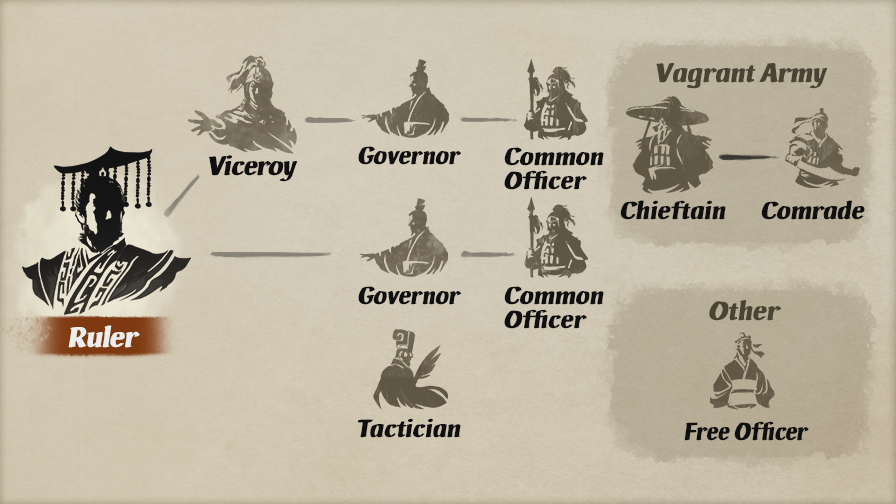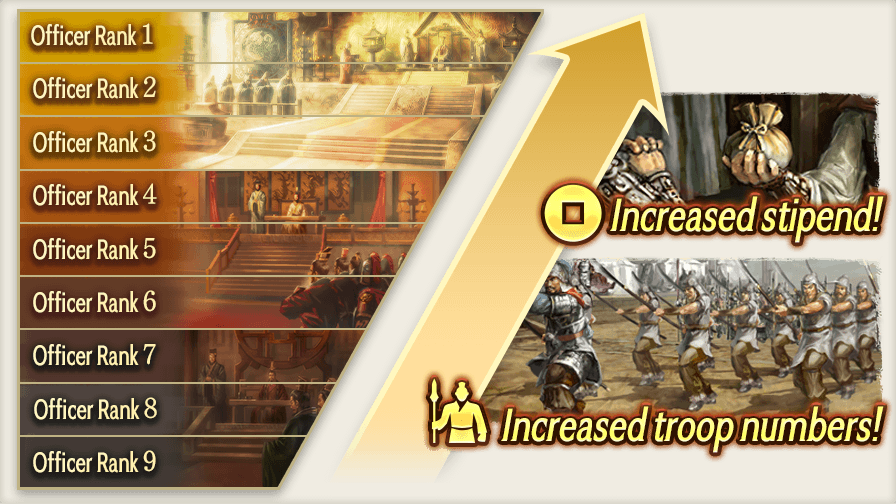Game Overview
You play as an officer in the age of the Three Kingdoms. Will you unify the land, serve your lord as a tactician, or roam the realm as your own master? The choice is yours.
Winning the Game
From unifying the nation to cultivating a reputation that will etch your name in the annals of history, there are several ways to win the game.
Winning through Unification
The game will end when one of the forces unifies the nation.
Your status, reputation, and the conditions of various cities all affect the ending you receive.
Winning through Tales
Completing Tales events of the Ending type will end the game without the nation being unified.
These endings include the following variations:
| Region Unification | Achieved if the protagonist's force unifies a single region. |
|---|---|
| Interim | Achieved if the protagonist controls a majority of the cities, including Luoyang, Chang'an, Xuchang, Chengdu, Moling (Jianye), and Ye. |
| Personal | Achieved based on the protagonist's reputation, the number of specialties they own, and other personal conditions. |
Game Over
The game will end in failure under the following conditions:
- · The protagonist dies without leaving a successor (spouse, child, sworn sibling, etc.), or their successor refuses to succeed them
- · You do not reach an ending before the year 350
Statuses and Ranks
Officers have various statuses, such as ruler or tactician, that dictate which actions they can perform.
They also have ranks from 1 to 9, with Rank 1 being the highest. The higher their rank, the larger their stipend and the number of troops they can lead.
Status

The eight statuses are ruler, viceroy, governor, tactician, common officer, chieftain, comrade, and free officer.
Chieftains and comrades are found in vagrant armies (forces without cities under their control), while free officers do not belong to any force.
| Rulers | The leaders of forces. Rulers can carry out strategies that affect the entire force, such as the formation of diplomatic alliances. Most commands can be executed at their own discretion. |
|---|---|
| Viceroys | The leaders of divisions. Viceroys are entrusted by a ruler with control over a division containing multiple cities. They can give orders to the cities within their division, such as the order to march. |
| Governors | The leaders of cities. Governors can assign their subordinates missions and carry out strategies that affect their city. |
| Tacticians | Tacticians are strategic advisors to city leaders. Giving sound advice increases Merit, while repeatedly giving unwise advice may result in demotion. Tacticians are able to suggest more strategies than common officers. The types of strategies a tactician can suggest depend on the status of the officer they serve. |
| Common Officers | Common officers carry out missions given to them by rulers and governors. Earning Merit can lead to advancement in rank and possibly promotion. Common officers receive Merit for completing the missions assigned to them and making effective suggestions in parliament. |
| Chieftains | Chieftains lead vagrant armies. They can execute fewer commands and have less income at their disposal than rulers. A chieftain can become the ruler of a city either by raising a banner in an unclaimed city or conquering a city held by another force. |
| Comrades | These officers serve the chieftain of a vagrant army. Instead of receiving missions like common officers, they employ new comrades and prepare to raise banners in new territories. |
| Free Officers | Free officers do not serve any force. They can travel the realm interacting with other officers, accept requests, complete Tales events, and otherwise enjoy free rein. Pledging their service at the palace of a city allows them to join a force. Alternatively, they can rise up in their homeland and become the chieftain of a vagrant army. |
Forces and Vagrant Armies
All officers are either part of a force or a vagrant army, or free officers serving no one.
Force
Each force has a ruler who controls a city.
Viceroys, tacticians, governors, and common officers serve as their subordinates.
Forces receive income of gold, troops, and supplies from the cities they control.
Vagrant Army
Vagrant armies are ruled by chieftains and have no cities under their control. Officers known as comrades serve under the chieftain's command.
The city the vagrant army is based in will provide a small amount of income. This home base can be moved to a different city.
Conquering a city or raising banner in an unclaimed city will cause the chieftain to become a ruler and the vagrant army to be transformed into a force.
Free Officers
Free officers are those who don't belong to a force or a vagrant army.
If a free officer chooses to join a force, they will become a common officer. If they instead choose to rise up in a city, they will become the chieftain of a vagrant army.
